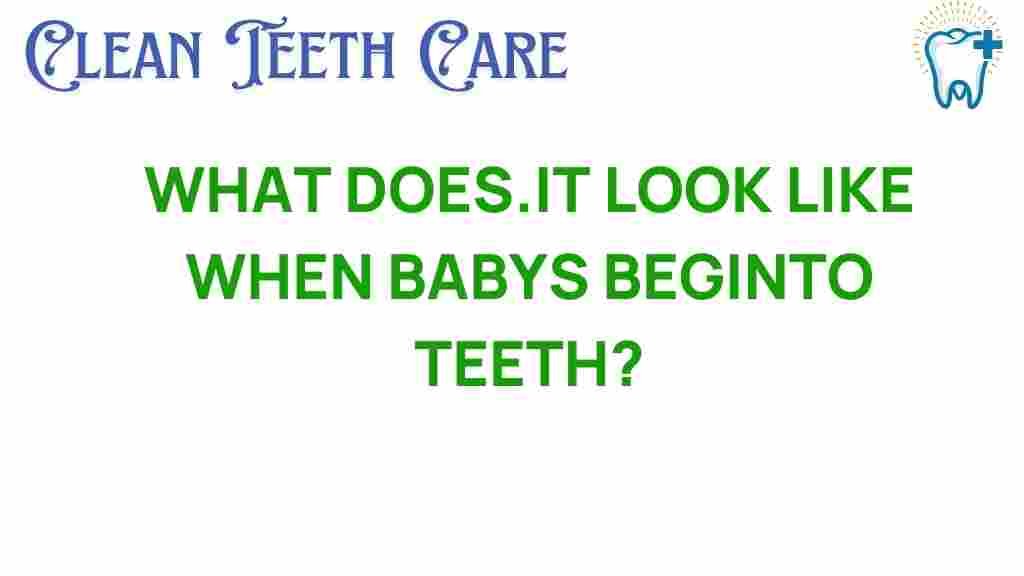The Fascinating Journey of Baby Teeth
As parents, witnessing the transition of our infants into toddlers is both an exciting and challenging journey. One of the significant milestones in this phase is the emergence of baby teeth. These tiny pearly whites play a crucial role in your child’s development, influencing their ability to eat, speak, and maintain overall oral hygiene. In this article, we will explore what to expect during the teething process, the signs of teething, and essential parenting tips to ensure your infant’s dental health is well-maintained.
Understanding Baby Teeth
Baby teeth, also known as primary teeth, usually begin to appear when a child is around six months old. This process varies from child to child, with some babies getting their first teeth earlier or later. By the age of three, most children will have a complete set of 20 baby teeth, which will eventually be replaced by adult teeth.
The primary teeth serve several vital functions:
- Facilitating Eating: Baby teeth allow infants to chew solid foods, helping them transition from liquids to a more varied diet.
- Supporting Speech Development: Properly aligned teeth aid in the formation of sounds and words as your child learns to speak.
- Guiding Permanent Teeth: Baby teeth hold space in the jaw for adult teeth, ensuring they come in correctly.
Teething Signs to Look Out For
Teething can be uncomfortable for babies, leading to various signs that indicate they are experiencing this natural process. Common teething signs include:
- Increased Drooling: Excess saliva production is common during teething.
- Irritability: Babies may become fussy or irritable as they experience discomfort.
- Chewing on Objects: Infants often chew on toys, fingers, or other objects to soothe their gums.
- Swollen Gums: The gums may appear red and swollen where the teeth are emerging.
- Changes in Sleep Patterns: Teething can disrupt a baby’s sleep schedule, leading to more frequent waking.
Infant Dental Health: Importance and Care
Maintaining good infant dental health is essential for your child’s overall well-being. Here are some tips to promote healthy teeth:
- Begin Oral Hygiene Early: Even before teeth emerge, gently wipe your baby’s gums with a soft, damp cloth after feedings.
- Introduce a Toothbrush: Once the first tooth appears, start brushing with a soft-bristled toothbrush and water.
- Limit Sugary Foods: Avoid giving sugary snacks as they can lead to cavities in baby teeth.
- Regular Dental Check-ups: Schedule your child’s first dental visit by their first birthday or when the first tooth appears.
Teething Remedies to Soothe Discomfort
As your baby navigates through the teething phase, you may want to explore some teething remedies to alleviate their discomfort:
- Cold Compress: A cold washcloth or teething toy can provide soothing relief when applied to sore gums.
- Teething Rings: Soft, chilled teething rings can help massage gums and ease pain.
- Over-the-Counter Pain Relievers: Consult your pediatrician about using infant acetaminophen or ibuprofen if your baby is in significant pain.
- Natural Remedies: Some parents find relief through chamomile tea or diluted essential oils, but always check with your doctor first.
Parenting Tips for Teething Babies
Parenting during the teething phase can be a challenge. Here are some parenting tips to help you manage:
- Stay Calm: Your baby can pick up on your stress, so try to remain calm and comforting.
- Offer Distractions: Engage your baby in play to distract them from discomfort.
- Maintain Routines: Keeping a consistent routine can provide stability and comfort during this unsettling time.
- Be Patient: Remember, teething is a phase that will pass, so patience is key.
Child Development and Teething
The emergence of baby teeth is not only a physical development but also ties into overall child development. As your child grows, their ability to chew and speak will improve, laying the groundwork for a healthy lifestyle. Here’s how teething impacts their development:
- Nutrition: The ability to chew solid foods is essential for proper nutrition during the critical growth stages.
- Language Skills: The development of speech is closely linked to oral health and the presence of teeth.
- Social Skills: Interactions with peers during mealtime can foster social skills as they learn to share and enjoy food together.
Oral Hygiene Practices for Parents
To ensure your child develops good oral hygiene habits, it’s essential for parents to model these practices. Here are some strategies for instilling healthy habits:
- Brush Together: Make brushing a family activity to encourage your child.
- Use Positive Reinforcement: Praise your child for brushing their teeth to create a positive association.
- Make it Fun: Use songs or games to make brushing enjoyable for your child.
Troubleshooting Teething Troubles
Despite your best efforts, some babies may experience more intense symptoms during teething. Here are some troubleshooting tips to help you manage:
- Monitor Temperature: If your baby has a fever, consult with your pediatrician to rule out other causes.
- Check for Ear Infections: Sometimes teething can coincide with ear infections. Be aware of signs like tugging at the ears or excessive crying.
- Document Symptoms: Keeping a diary of your baby’s symptoms can help you identify patterns and provide information to your pediatrician.
Conclusion
The journey of baby teeth is a fascinating and essential part of your child’s development. Understanding the teething signs, maintaining proper infant dental health, and using effective teething remedies can make this process smoother for both you and your baby. Remember, every child is different, and patience is key during this time. For more parenting tips and guidance on child development, explore resources like Parenting.com. Additionally, don’t hesitate to consult with your pediatric dentist to ensure your child’s oral health is on the right track. Embrace this exciting milestone, and enjoy each stage of your baby’s growth!
This article is in the category Kids and created by CleanTeethCare Team
